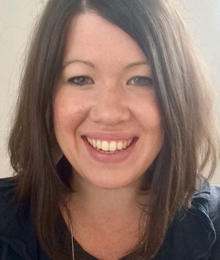An interview with Katherine Duncan
April 2020
Dr Katherine Duncan is Chancellor’s Research Fellow and Lecturer in Marine Natural Products Drug Discovery at the University of Strathclyde. She is a member of the Microbiology Society and sits on the Prokaryotic Division. In this interview, she tells us more about her research, how she is championing women in science and participating in a global science in leadership program, and why microbiology matters.

Tell us about your research.
We look at the chemical language of micro-organisms and what factors influence this metabolite exchange. In particular, we are interested in the biological (i.e. phylogeny) and environmental (i.e. biogeography) effects on the specialised metabolism of bacteria from the oceans.
Why is this type of research important to microbiology?
Ultimately, understanding these big picture questions will enable informed and targeted biodiscovery of new chemistry from underexplored ecosystems which is greatly needed in this antimicrobial resistance era.
What qualifications did you obtain before starting this role?
I have a master’s degree in Chemistry (MChem from the University of Aberdeen) and carried out an international placement in Florida, which focused on marine natural products. Following this, I decided to learn molecular biology and microbiology and completed a four year PhD in Biomedical Sciences at the University of Prince Edward Island, Canada. I then completed a two postdoctoral fellowships, the first at Scripps Institution of Oceanography (University of California, San Diego) in Marine Biomedicine, and a second at the Scottish Marine Institute in Marine Biodiscovery.
What is a typical working day for you?
I’m not sure there is such a thing as a typical day as an academic. It’s one of the reasons I like my job, I interact with lots of different people, every day I am problem solving, learning something and ultimately, my research is discovery – the unpredictability is half the fun!
What are the professional challenges that present themselves and how do you try to overcome them?
Having equality, especially of women in senior academic positions, is something I am very passionate about. We all know action is needed, I am one of five science faculty members, taking part in a global women in science leadership program called Homeward Bound (not-for-profit).
Tell us about your biggest professional achievement(s) so far.
Doing what I love is incredible. I’ve wanted to do marine natural products research since I was 18. Therefore, I think my biggest professional achievement is helping others to build fulfilling careers in something they care about too, and it’s a privilege to play even a small part in this process.
You are an active member of the Microbiology Society – tell us more about your involvement.
I am on the Prokaryotic Division of the Microbiology Society (environmental microbiology). The Society creates a community, one which benefits all levels of career, so it’s wonderful to give a little back to a Society that has supported me so much, and I would encourage every member to get more involved at some stage of their career.
Why is it important to be a member of an organisation like the Microbiology Society?
The Microbiology Society is member-centric; there’s lots of ways to benefit, from conference grants to building diverse networks and learning from world-renowned experts.
Where did your interest in microbiology come from?
There are not many people that can say discovery is their job; as microbiologists, we’re fortunate that microbes are always at least one step ahead of us.
Why does microbiology matter?
Micro-organisms are a fundamental component of every ecosystem on the planet.


